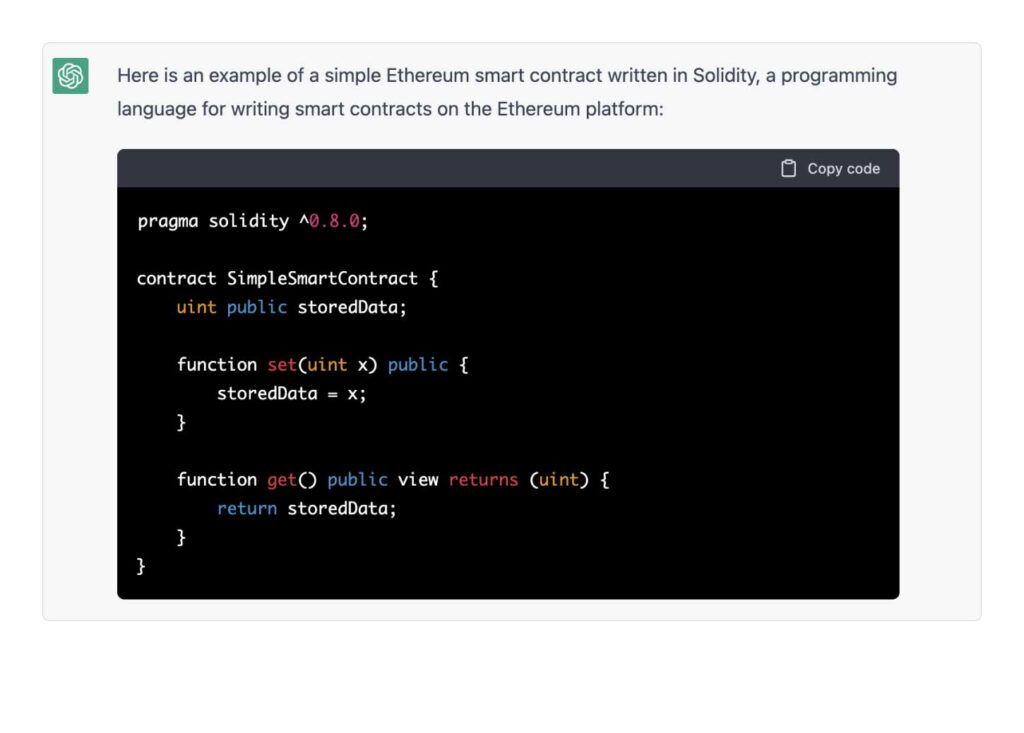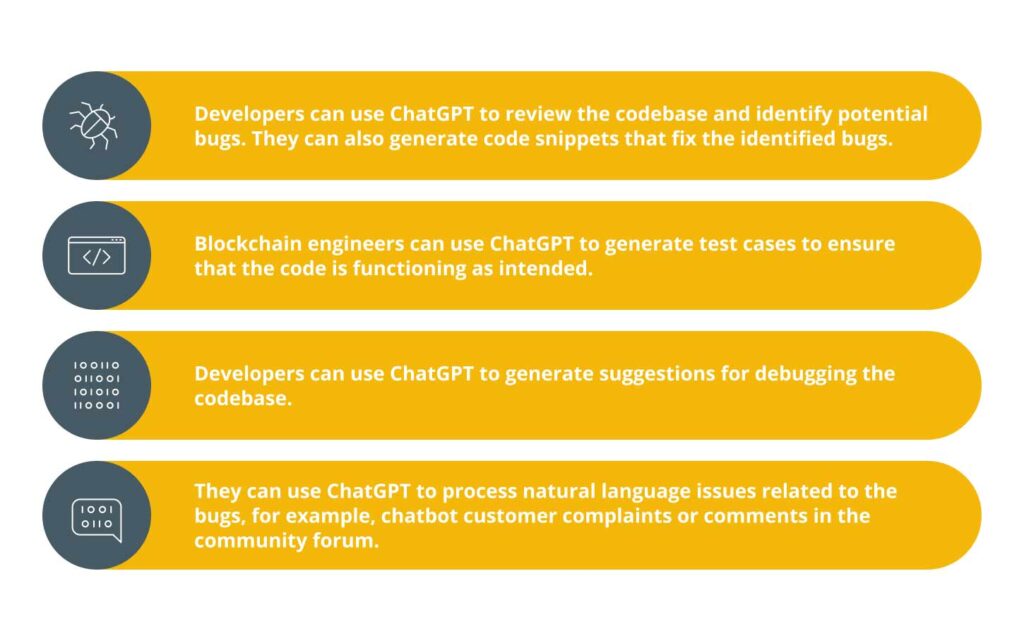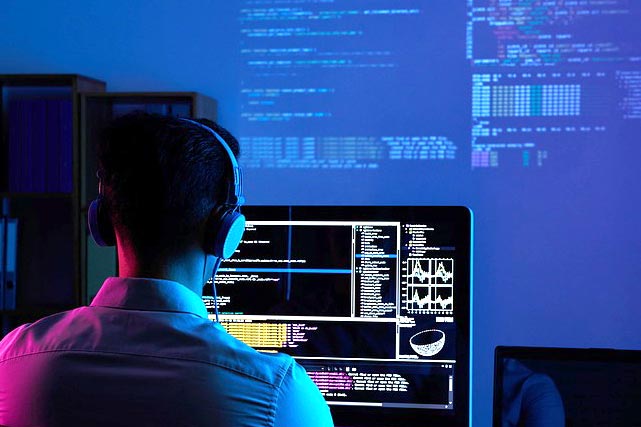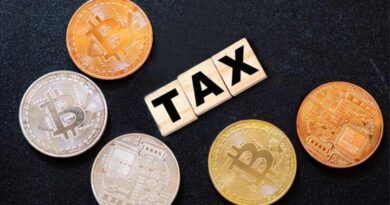10 ways ChatGPT can be used by blockchain developers
An artificial intelligence model called a language model may create or predict text after being trained on a huge corpus of text. It can be applied to both predict the likelihood of a word sequence as well as to generate new text, such as in machine translation. To learn the language’s structure and patterns, it employs machine learning and natural language processing algorithms.
Here are 10 ways ChatGPT may help blockchain devs get more done:
Creation of smart contracts:
By entering the appropriate parameters and conditions, ChatGPT may build smart contract code, saving developers’ time and lowering the likelihood of mistakes. Additionally, it can produce natural language explanations of the contract’s logic and features as well as samples of its potential applications in different contexts.

Moreover, ChatGPT can produce example code fragments that can be used to implement the logic of the contract. This can be used as a starting point for the actual implementation and to help developers better grasp the contract’s needs.
Code descriptions
Moreover, ChatGPT can be used to produce thorough documentation for smart contract programming. Documentation can include explanations of the code’s variables, classes, and functions as well as usage samples. Programmers can save time by using functions instead of constantly writing the same “chunk” of code.
A programmer can reuse information about a particular data type when making several instances of that data type by classifying that information. A variable is a value that can change depending on information provided to the program or factors outside the program.
To make the process of documenting the code more effective, ChatGPT may also generate documentation templates and integrate with code comments. For projects involving numerous developers, this can be very helpful since it makes sure that everyone is on the same page and can comprehend the codebase.
Community management
A blockchain project’s community can be managed and interacted with by means of ChatGPT. In order to help with community management, ChatGPT may automate responses to frequently asked questions, moderate conversations to make sure they adhere to community rules and stay on topic, and create content like blog posts or social media updates to interact with and update the community.
The community participation and sentiment data may also be analyzed and reported using ChatGPT, which is helpful for making data-driven decisions concerning community management models and strategies.
Market research
ChatGPT can be utilized to examine market conditions and trends for a specific blockchain project or the sector at large. Developers can use this to make well-informed choices on the course and progress of their projects. It can, for instance, be trained using historical market data and utilized to produce forecasts of potential future market trends.
It can also be used to analyze vast amounts of unstructured data, such as posts on social media or news articles, to uncover sentiment and opinions on certain businesses or goods. Also, it may be used to produce reports and summaries of market data in natural language, which makes it simpler for analysts to comprehend and convey their results.
Developing wallets
Blockchain wallets can be created and tested using ChatGPT. It can be used, for instance, to create user interfaces that explain wallet features and functioning in natural language. In order to make that wallet software is operating properly, it can also be used to build test cases and test data. Last but not least, ChatGPT can be employed to produce answers to user questions and help requests, giving users a more efficient and natural method to engage with their wallets.
Simulation
ChatGPT can be used by blockchain engineers for simulation in the following ways:
- Use ChatGPT to simulate various situations on a blockchain network, such as testing the network’s performance under various circumstances or simulating various types of attacks to see how the network would react.
- Similarly, they can mimic various user types’ behavior on a blockchain network using ChatGPT, which will help them better understand how the network would be used in real-world scenarios.
- Market simulation: To assist in their decision-making on the purchase or sale of blockchain assets, developers can utilize ChatGPT to simulate market circumstances and forecast the price of the assets.
- Economic simulation: To better comprehend how the network would operate in regards to tokens and crypto economics, blockchain engineers can use ChatGPT to simulate the economic incentives and disincentives of various actors on a blockchain network.
DApp development
ChatGPT is a language model, and only text-based systems can use it. There are several ways to create a decentralized application (DApp) utilizing ChatGPT, as detailed below:
- Creating smart contract code for different blockchains is one approach. By automating the process of developing smart contracts, this can make it simpler for programmers to launch DApps on the blockchain.
- Another method is to create UI/UX material using GPT-3 and then incorporate it into a decentralized application. The DApp may become more interesting and user-friendly as a result.
- A DApp’s chatbot capability can also be generated using ChatGPT, enabling users to communicate with the decentralized application in their own language.
Explainer videos
By offering natural language text that can be utilized as the video script, ChatGPT enables blockchain engineers to produce explainer videos. Moreover, ChatGPT can be used to create subtitles for videos, enhancing accessibility for those who are deaf or non-native speakers.
To make sure that it accurately and clearly conveys the concepts and functionalities of their blockchain project, the developers must revise and improve the text that ChatGPT generates.
White paper creation
With ChatGPT, white papers may be created by either fine-tuning the model on an existing data set of white papers or by giving it explicit prompts and instructions to generate text. To create writing that follows a particular format and tone, the model would first be trained on a set of relevant data, such as technical specifications and industry jargon. It can also help to guarantee that the model generates material that is targeted to those characteristics by giving it with details about the white paper’s intended audience and purpose.
Finding and fixing bugs
Bugs in the code of smart contracts can be found and fixed using ChatGPT. ChatGPT can produce the required patch by taking the code and identifying the issue, which will cut down on the time and work needed to address the problem. This is a list of a few applications for it:

It’s critical to remember that these are hypothetical use cases and that the final result could change based on the particulars of the project and the caliber of the data set used to train the model. Also, it’s critical to have programmers verify the model’s output.
ChatGPT’s prospective future
For blockchain engineers, ChatGPT is a powerful resource that can be used to speed up work and interact with the community. While creating tokens, DApps, smart contracts, or performing market research, ChatGPT can assist businesses cut time and effort costs while improving the quality of their work. The use cases for ChatGPT in this industry may develop as blockchain technology continues to advance.




